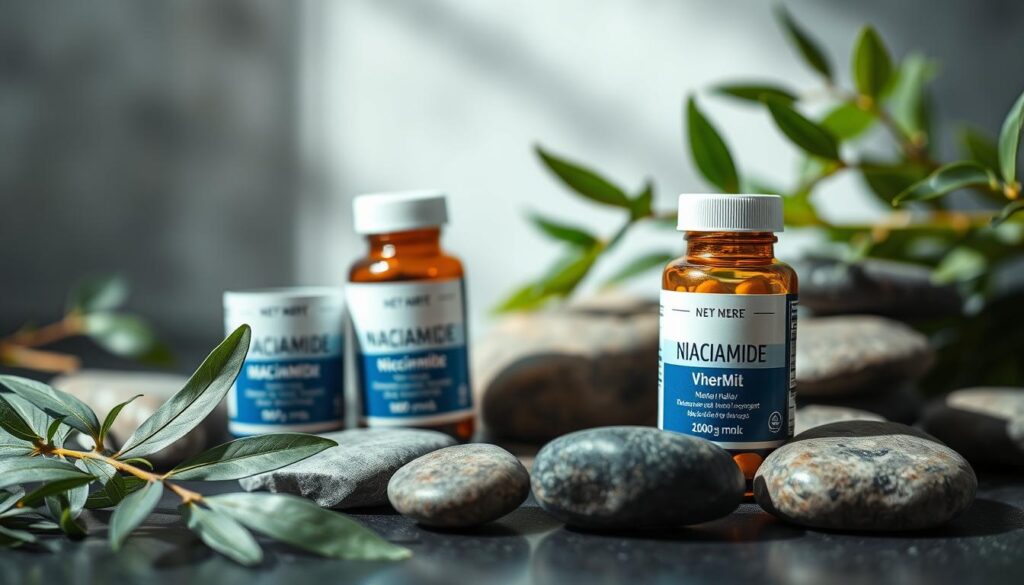When joint stiffness strikes, finding effective and natural remedies can be a game-changer. Enter B3 niacinamide, a versatile nutrient that may offer a promising solution for those seeking relief from achy, stiff joints. In this article, we’ll dive into the power of niacinamide and explore how it can support joint health and mobility.
Key Takeaways
- Niacinamide, also known as B3, may help alleviate joint stiffness and discomfort.
- It works by reducing inflammation and supporting joint function.
- Niacinamide can be obtained through dietary sources or supplements.
- Topical application of niacinamide-containing creams and gels may also provide localized relief.
- Incorporating niacinamide as part of a holistic approach to joint health can be beneficial.
Understanding Joint Stiffness
Joint stiffness can be a frustrating and debilitating condition that affects individuals of all ages. Whether it’s the result of an injury, arthritis, or simply the natural aging process, joint stiffness can significantly impact one’s quality of life. Understanding the underlying causes and symptoms of joint stiffness is the first step in finding effective solutions for inflammation reduction and improved joint health.
What Causes Joint Stiffness?
The primary causes of joint stiffness include:
- Osteoarthritis: The gradual wear and tear of the cartilage that cushions the joints, leading to inflammation and joint stiffness.
- Rheumatoid Arthritis: An autoimmune disorder that causes the body’s immune system to attack the joints, resulting in inflammation and stiffness.
- Injury or Trauma: Sprains, strains, or other injuries can damage the joints and lead to ongoing stiffness and discomfort.
- Inactivity: Prolonged periods of inactivity, such as during periods of immobilization or bedrest, can cause the joints to stiffen.
Common Symptoms of Joint Stiffness
The primary symptoms of joint stiffness include:
- Difficulty moving the affected joint(s)
- Decreased range of motion
- Pain and discomfort in the joint(s)
- Swelling or inflammation around the joint(s)
- Stiffness that is especially pronounced in the morning or after periods of inactivity
When to Seek Medical Help
If you are experiencing persistent or worsening joint stiffness, it’s important to seek medical attention. A healthcare professional can help diagnose the underlying cause and develop an appropriate treatment plan, which may include strategies for arthritis management, such as medication, physical therapy, or lifestyle modifications.
By understanding the causes and symptoms of joint stiffness, individuals can take proactive steps to address this issue and improve their overall joint health and mobility.
Introduction to Niacinamide
Niacinamide, also known as vitamin B3, is a versatile and increasingly popular nutrient with a wide range of health benefits. As a form of vitamin B3, niacinamide plays a crucial role in numerous bodily functions, making it an essential component of a balanced diet.
What is B3 Niacinamide?
Niacinamide is a water-soluble vitamin that is closely related to niacin, another form of vitamin B3. While niacin and niacinamide share many similarities, they have distinct properties and uses. Niacinamide is particularly valued for its ability to support joint health and provide natural relief from joint stiffness.
How Niacinamide Works in the Body
Niacinamide is essential for the proper functioning of the body’s cells, as it plays a crucial role in the conversion of food into energy. It also helps to support the health of the skin, nervous system, and digestive system. When it comes to joint health, niacinamide has been shown to help reduce inflammation and promote better joint function.
The benefits of niacinamide supplements and vitamin B3 benefits have been the subject of extensive research, with studies highlighting its potential to alleviate joint stiffness and support overall joint well-being.

“Niacinamide is a powerful player in the realm of joint health, offering natural relief and support for those struggling with joint stiffness and discomfort.”
The Role of Niacinamide in Joint Health
Niacinamide, also known as vitamin B3, has emerged as a promising natural solution for supporting joint health. This essential nutrient has been the subject of extensive research, showcasing its ability to address the underlying causes of joint stiffness and discomfort.
Benefits of Niacinamide for Joint Function
One of the primary benefits of niacinamide is its anti-inflammatory properties. Niacinamide has been shown to reduce inflammation in the joints, which is a common driver of stiffness and pain. By targeting the inflammatory pathways, this anti-inflammatory nutrient can help improve overall joint function and mobility.
Additionally, niacinamide has been found to support the production of collagen, a vital structural protein that is essential for maintaining the integrity and flexibility of joint tissues. By promoting collagen synthesis, niacinamide can contribute to the repair and regeneration of cartilage, ligaments, and tendons, ultimately enhancing joint health and reducing the risk of further damage.
Research Supporting Niacinamide Use
Numerous studies have explored the efficacy of niacinamide in addressing joint-related issues. A comprehensive review published in the Journal of the American College of Nutrition found that niacinamide supplementation significantly improved joint function, reduced pain, and decreased the need for anti-inflammatory medications in individuals with osteoarthritis.
“Niacinamide has demonstrated the ability to modulate inflammatory pathways and support the structural integrity of joint tissues, making it a valuable natural option for those seeking relief from joint stiffness and discomfort.”
Another study, published in the Journal of Orthopaedic Surgery and Research, reported that patients with rheumatoid arthritis who supplemented with niacinamide experienced a reduction in joint swelling, improved range of motion, and decreased reliance on pain medication.
These research findings highlight the potential of b3 niacinamide as an effective and safe approach to supporting joint health and alleviating the symptoms of joint stiffness.
How B3 Niacinamide Helps with Joint Stiffness
B3 niacinamide, a form of vitamin B3, has garnered attention for its potential to alleviate joint stiffness. This essential nutrient works through various mechanisms to support joint health and mobility.
Mechanisms of Action
Niacinamide exerts its beneficial effects on joints by targeting multiple pathways in the body. It plays a crucial role in reducing inflammation, which is a primary contributor to joint stiffness and discomfort. Niacinamide inhibits the production of inflammatory cytokines, molecules that drive the inflammatory response, thereby helping to minimize joint swelling and pain.
Reducing Inflammation
In addition to its anti-inflammatory properties, niacinamide also enhances joint mobility by improving collagen synthesis. Collagen is a crucial structural protein found in the cartilage and connective tissues surrounding the joints. By supporting collagen production, niacinamide helps maintain the integrity and flexibility of these important joint components, ultimately promoting better joint function and joint mobility.
Niacinamide’s versatile mechanisms of action make it a promising natural solution for individuals seeking relief from inflammation reduction and improved joint health. By addressing the root causes of joint stiffness, this B3 vitamin can play a vital role in managing this common condition and enhancing overall joint function.

“Niacinamide has been shown to effectively alleviate joint stiffness and discomfort by targeting the underlying inflammatory processes and supporting joint structure and function.”
How to Incorporate Niacinamide in Your Diet
Niacinamide, also known as vitamin B3, is an essential nutrient that can be easily incorporated into your daily diet. By understanding the food sources rich in niacinamide and the various supplement options available, you can take a proactive approach to supporting your joint health.
Food Sources Rich in Niacinamide
Niacinamide is naturally present in a variety of whole foods, making it easy to increase your intake through a balanced diet. Some of the top food sources of niacinamide include:
- Lean meats, such as chicken, turkey, and fish
- Nuts and seeds, including peanuts, almonds, and sunflower seeds
- Whole grains, such as brown rice, quinoa, and whole-wheat bread
- Leafy green vegetables, like spinach and kale
- Legumes, including lentils, kidney beans, and chickpeas
Supplements: Dosage and Forms
For individuals who may need additional niacinamide support, supplements can be a convenient option. When choosing a niacinamide supplement, it’s important to follow the recommended dosage and consider the different forms available:
- Dosage: The recommended daily intake of niacinamide for adults is typically between 14-16 mg. However, higher doses may be prescribed by healthcare professionals for specific conditions.
- Forms: Niacinamide supplements can be found in various forms, including capsules, tablets, and powders. Some individuals may also prefer topical niacinamide creams or gels for localized joint support.
Remember to always consult with a healthcare professional before starting any new supplement regimen, especially if you have existing medical conditions or are taking other medications.
“Incorporating niacinamide-rich foods and supplements can be a valuable addition to a holistic approach for supporting joint health and managing joint stiffness.”
Topical Applications of Niacinamide
Beyond the benefits of niacinamide supplements, this vital nutrient can also be found in topical creams and gels that can provide joint pain relief and support overall joint health. These targeted topical niacinamide products offer a convenient way to address localized joint concerns and stiffness.
Creams and Gels Containing Niacinamide
A variety of topical skin care products on the market now incorporate niacinamide as a key ingredient. These can include moisturizing creams, joint-specific gels, and even pain-relieving ointments. The concentration of niacinamide in these formulas can vary, so it’s important to read labels and choose a product that suits your needs.
How to Use Topical Niacinamide for Relief
To use a topical niacinamide product for joint pain and stiffness, follow these steps:
- Gently cleanse and dry the affected joint area.
- Apply a small amount of the niacinamide cream or gel to the joint, massaging it in until fully absorbed.
- Use the product as directed, typically 1-2 times per day or as needed for relief.
- Be patient, as it may take several applications to experience the full benefits.
Incorporating topical niacinamide into your joint health routine can provide a natural, targeted approach to managing discomfort and promoting optimal joint function. As always, consult your healthcare provider before using any new supplements or treatments.
“Niacinamide is a versatile nutrient that can be effectively delivered through topical applications to address joint-related concerns.”

Potential Side Effects of Niacinamide
While niacinamide, also known as vitamin B3, is generally well-tolerated, it’s important to be aware of potential side effects and interactions. Understanding these considerations can help you make informed decisions about incorporating niacinamide into your health regimen.
Allergic Reactions and Sensitivities
In rare cases, some individuals may experience niacinamide side effects such as skin irritation, redness, or itching. These reactions are typically the result of an allergic response or sensitivity to the compound. If you notice any adverse reactions after taking or applying niacinamide, discontinue use and consult your healthcare provider.
Interactions with Other Medications
Niacinamide may interact with certain medications, including those used to treat diabetes, high cholesterol, and blood thinners. Medication interactions can potentially alter the effectiveness of these drugs or increase the risk of side effects. Always inform your healthcare provider about any supplements, including niacinamide, that you are taking to ensure safe and appropriate use.
| Medication | Potential Interaction |
|---|---|
| Diabetes Medications | Niacinamide may affect blood sugar levels and impact the effectiveness of diabetes medications. |
| Cholesterol-Lowering Drugs | Niacinamide may interact with certain cholesterol-lowering medications, potentially altering their effectiveness. |
| Blood Thinners | Niacinamide may increase the risk of bleeding when taken with blood-thinning medications. |
It’s crucial to consult with a healthcare professional before introducing niacinamide or any other supplement into your routine, especially if you are currently taking prescription medications. This will help ensure your safety and maximize the potential benefits of niacinamide.

Lifestyle Changes to Support Joint Health
While niacinamide can provide natural relief for joint stiffness, incorporating complementary lifestyle changes can further enhance the benefits for your joint mobility and cartilage health. Let’s explore the importance of exercise, maintaining mobility, and dietary modifications that can support your overall joint well-being.
Importance of Exercise and Mobility
Regular physical activity is crucial for maintaining healthy joints. Low-impact exercises, such as swimming, cycling, or gentle yoga, can help improve joint mobility and increase cartilage flexibility without putting excessive stress on the joints. Engaging in these activities several times a week can help reduce inflammation, strengthen the surrounding muscles, and promote better joint function.
Dietary Changes for Joint Wellbeing
In addition to incorporating niacinamide, making certain dietary adjustments can also support your joint health. Increasing your intake of anti-inflammatory foods, such as omega-3-rich fish, leafy greens, and berries, can help reduce inflammation and promote better joint mobility. Moreover, ensuring you get enough vitamins and minerals, like vitamin C, calcium, and magnesium, can contribute to the overall health and strength of your joints and cartilage.
| Nutrient | Benefits for Joint Health |
|---|---|
| Omega-3 Fatty Acids | Reduce inflammation and joint pain |
| Vitamin C | Supports collagen production and cartilage health |
| Calcium | Maintains strong bones and joint structure |
| Magnesium | Helps with muscle and nerve function, reducing joint stiffness |
By incorporating these lifestyle changes alongside the use of niacinamide, you can take a comprehensive approach to supporting your joint health and improving your overall quality of life.

Conclusion: Embracing Natural Solutions
As we’ve explored, B3 niacinamide holds immense promise as a natural remedy for joint stiffness and discomfort. From reducing inflammation to improving joint function, this versatile compound offers a compelling alternative to traditional treatments. By incorporating niacinamide-rich foods and supplements into your daily routine, you can take a proactive approach to managing arthritis and other joint-related conditions.
Summary of Benefits
Niacinamide, a form of vitamin B3, has been shown to effectively alleviate joint stiffness, reduce inflammation, and enhance overall joint health. Its mechanisms of action target the root causes of joint discomfort, making it a valuable addition to any arthritis management plan. The research supporting the use of niacinamide for joint health is compelling, and many individuals have experienced positive results from incorporating this natural solution into their wellness regimen.
Encouraging a Holistic Approach to Joint Health
While niacinamide offers a promising natural remedy, it’s important to recognize that a holistic approach to joint health is often the most effective. Alongside incorporating niacinamide, making lifestyle changes such as regular exercise, maintaining a nutrient-dense diet, and prioritizing overall wellness can contribute significantly to managing arthritis and promoting natural remedies for joint arthritis management. By embracing a comprehensive strategy, you can empower yourself to take control of your joint health and improve your quality of life.